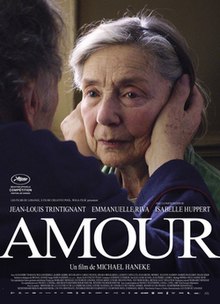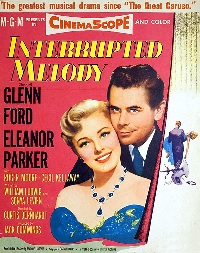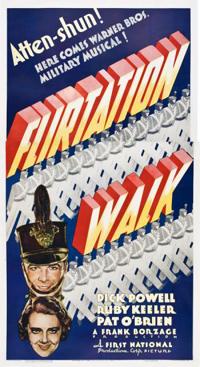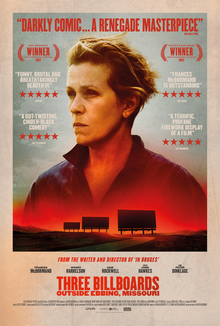Welcome to DU!
The truly grassroots left-of-center political community where regular people, not algorithms, drive the discussions and set the standards.
Join the community:
Create a free account
Support DU (and get rid of ads!):
Become a Star Member
Latest Breaking News
Editorials & Other Articles
General Discussion
The DU Lounge
All Forums
Issue Forums
Culture Forums
Alliance Forums
Region Forums
Support Forums
Help & Search
Classic Films
Related: About this forumTCM - Saturday, Feb. 8 - 31 Days of Oscar - Captain Blood, How the West Was Won, Imitation of Life
Last edited Fri Feb 7, 2025, 04:29 PM - Edit history (1)

The Day At a Glance
31 DAYS OF OSCAR - DAY 7
- PATIENTS
Amour (2012) (TCM Premiere)
Interrupted Melody (1955)
Camille (1937)
Saturday, February 8
- TCM DAYTIME
31 DAYS OF OSCAR - DAY 8
- BEST PICTURE
Flirtation Walk (1934) (6:15 am ET)
Here Comes the Navy (1934)
Captain Blood (1935)
Cimarron (1931)
How the West Was Won (1962)
All Quiet on the Western Front (1930)
- TCM PRIMETIME
31 DAYS OF OSCAR - DAY 8
- MOTHERS
Places in the Heart (1984)
Three Billboards Outside Ebbing, Missouri (2017) (TCM Premiere)
Imitation of Life (1959)
Mildred Pierce (1945)
Mrs. Miniver (1942)
The Daily Schedule
12:00 AM Amour (2012)

Amour (French: "Love"
Amour premiered at the 2012 Cannes Film Festival, where it won the Palme d'Or, making Haneke the second filmmaker to win twice consecutively. The film garnered critical acclaim for its direction, screenplay, and the performances of Trintignant and Riva. It has been widely regarded by critics as one of the greatest films of the 21st century. Amour won the Academy Award for Best Foreign Language Film, in addition of four nominations (including Best Picture and Best Director) at the 85th Academy Awards, among numerous accolades.
Dir: Michael Haneke Cast: Jean-Louis Trintignant, Emmanuelle Riva, Isabelle Huppert
Runtime: 127 mins Genre: Drama Rating: TV-14 CC:
Oscar nominations:
ACTRESS IN A LEADING ROLE -- Emmanuelle Riva {"Anne"}
DIRECTING -- Michael Haneke
FOREIGN LANGUAGE FILM -- Austria
BEST PICTURE -- Margaret Menegoz, Stefan Arndt, Veit Heiduschka and Michael Katz, Producers
WRITING (Original Screenplay) -- Written by Michael Haneke
Trivia: Not a word of the script was changed during production. The film was shot exactly as it was written, word for word.
2:15 AM Interrupted Melody (1955)

True story of Australian opera singer Marjorie Lawrence and her battle against polio.
Dir: Curtis Bernhardt Cast: Glenn Ford, Eleanor Parker, Roger Moore
Runtime: 106 mins Genre: Drama Rating: TV-PG CC: Y
Oscar nominations:
ACTRESS -- Eleanor Parker {"Marjorie Lawrence"}
COSTUME DESIGN (Color) -- Helen Rose
*WINNER* WRITING (Story and Screenplay) -- William Ludwig, Sonya Levien
Trivia: Eleanor Parker can read music, and has perfect pitch as a singer. She decided to study the scores of the opera songs used in this movie on her own. She rented a cabin in Lake Arrowhead, California, and played the records while singing along, until she had the breathing and phrasing memorized. Then when filming the scenes, instead of lip-synching to the tracks recorded by Eileen Farrell for the movie, she sang full voice (but an octave lower). She is proud of the fact that they never had to do a re-take, in order to "match" the tapes. She nailed it on the first take every time.
4:15 AM Camille (1937)

Camille is a 1936 American romantic drama film from Metro-Goldwyn-Mayer directed by George Cukor, and produced by Irving Thalberg and Bernard H. Hyman, from a screenplay by James Hilton, Zoë Akins, and Frances Marion. The picture is based on the 1848 novel and 1852 play La dame aux camélias by Alexandre Dumas, fils. The film stars Greta Garbo, Robert Taylor, Lionel Barrymore, Elizabeth Allan, Jessie Ralph, Henry Daniell, and Laura Hope Crews. It grossed $2,842,000.
Camille was included in Time magazine's "All-Time 100 Movies" in 2005. It was also included at #33 in AFI's 100 Years...100 Passions. Garbo received her third Best Actress nomination for Camille at the 10th Academy Awards in 1938.
Dir: George Cukor Cast: Greta Garbo, Robert Taylor, Lionel Barrymore
Runtime: 108 mins Genre: Romance Rating: TV-PG CC: Y
Oscar nominations:
ACTRESS -- Greta Garbo {"Marguerite Gautier (Camille)"}
Trivia: Greta Garbo's personal favorite of all her films.
Trivia: The only memento of Hollywood kept by Greta Garbo was a pair of Adrian-designed kid gloves from this film. White leather, they were beaded with an ivy leaf pattern that spelled out her initials "G.G." over and over.
6:15 AM Flirtation Walk (1934)

A West Point cadet falls for his commanding officer's daughter.
Dir: Frank Borzage Cast: Dick Powell, Ruby Keeler, Pat O'Brien
Runtime: 97 mins Genre: Musical Rating: TV-G CC: Y
Oscar nominations:
OUTSTANDING PRODUCTION -- First National
SOUND RECORDING -- Warner Bros.-First National Studio Sound Department, Nathan Levinson, Sound Director [came in 2nd]
Trivia: Bobby Connolly shot the Hawaiian number on the biggest set ever constructed at Warner Bros. studio up to that time. He followed with the military wedding number, using 400 professional dancers.
8:15 AM Here Comes the Navy (1934)

A cocky naval cadet clashes with an old friend serving with him.
Dir: Lloyd Bacon Cast: James Cagney, Pat O'Brien, Gloria Stuart
Runtime: 86 mins Genre: Comedy Rating: TV-PG CC: Y
Oscar nominations:
OUTSTANDING PRODUCTION -- Warner Bros.
Trivia: The movie was filmed in the spring of 1934 on the U.S.S. Arizona, which was sunk on 7 December 1941 at Pearl Harbor.
10:00 AM Captain Blood (1935)

A young Irish doctor is exiled as a slave to Barbados where he captures a Spanish galleon and becomes the most feared pirate of the Caribbean.
Dir: Michael Curtiz Cast: Errol Flynn, Olivia De Havilland, Lionel Atwill
Runtime: 119 mins Genre: Adventure Rating: TV-G CC: Y
Oscar nominations:
DIRECTING -- Michael Curtiz [came in 2nd]
[NOTE: THIS IS NOT AN OFFICIAL NOMINATION. Write-in candidate.]
MUSIC (Scoring) -- Warner Bros.-First National Studio Music Department, Leo Forbstein, head of department (Score by Erich Wolfgang Korngold) [came in 3rd]
[NOTE: THIS IS NOT AN OFFICIAL NOMINATION. Write-in candidate.]
OUTSTANDING PRODUCTION -- Cosmopolitan [came in 3rd]
SOUND RECORDING -- Warner Bros.-First National Studio Sound Department, Nathan Levinson, Sound Director [came in 2nd]
WRITING (Screenplay) -- Casey Robinson [came in 3rd]
[NOTE: THIS IS NOT AN OFFICIAL NOMINATION. Write-in candidate.]
Trivia: The first screen duel between Errol Flynn and Basil Rathbone, which would be reprised three years later (and to grander effect) in The Adventures of Robin Hood (1938).
12:15 PM Cimarron (1931)

Cimarron is a 1931 pre-Code epic Western film starring Richard Dix and Irene Dunne, and directed by Wesley Ruggles. Released by RKO, it won Academy Awards for Best Picture, Best Adapted Screenplay (written by Howard Estabrook and based on Edna Ferber's 1930 novel Cimarron), and Best Production Design (by Max Rée).
Both Dix and Dunne were nominated for their leading roles, and Edward Cronjager for Best Cinematography, but did not win. Estelle Taylor, Edna May Oliver, and Roscoe Ates appeared in supporting roles. Epic in scope, spanning forty years from 1889 to 1929, Cimarron was RKO's most expensive production up to that date, as well as its first production to win the Best Picture Oscar. It was a critical success, although it did not recoup its production costs during its initial run in 1931.
It is the first of four Westerns to ever win the top honor at the Academy Awards, being followed almost 60 years later by Dances with Wolves in 1990, Unforgiven in 1992, and No Country For Old Men in 2007.
Due to being a film published in 1931, it will enter the public domain on January 1, 2027.
Dir: Wesley Ruggles Cast: Richard Dix, Irene Dunne, Estelle Taylor
Runtime: 124 mins Genre: Western Rating: TV-PG CC: Y
Oscar nominations:
ACTOR -- Richard Dix {"Yancey Cravat"}
ACTRESS -- Irene Dunne {"Sabra Cravat"}
*WINNER* ART DIRECTION -- Max Rée
CINEMATOGRAPHY -- Edward Cronjager
DIRECTING -- Wesley Ruggles
*WINNER* OUTSTANDING PRODUCTION -- RKO Radio
*WINNER* WRITING (Adaptation) -- Howard Estabrook
2:30 PM How the West Was Won (1962)

How the West Was Won is a 1962 American epic Western film directed by Henry Hathaway (who directed three out of the five chapters), John Ford and George Marshall, produced by Bernard Smith, written by James R. Webb, and narrated by Spencer Tracy. The film centers on a family and their descendents over the span of decades as they explore and settle the American frontier of the United States.
Originally filmed in true three-lens Cinerama with the according three-panel panorama projected onto an enormous curved screen, the film features an ensemble cast formed by many cinema icons and newcomers, including (in alphabetical order) Carroll Baker, Lee J. Cobb, Henry Fonda, Carolyn Jones, Karl Malden, Gregory Peck, George Peppard, Robert Preston, Debbie Reynolds, James Stewart, Eli Wallach, John Wayne and Richard Widmark. The supporting cast features Brigid Bazlen, Walter Brennan, David Brian, Andy Devine, Raymond Massey, Agnes Moorehead, Henry (Harry) Morgan, Thelma Ritter, Mickey Shaughnessy and Russ Tamblyn.
How the West Was Won is widely considered one of Hollywood's greatest epics.[2] The film received widespread critical acclaim and was a box office success, grossing $50 million on a budget of $15 million.[3] At the 36th Academy Awards it earned eight nominations, including Best Picture, and won three, for Best Story and Screenplay Written Directly for the Screen, Best Sound and Best Film Editing. In 1997 it was selected for preservation in the United States National Film Registry by the Library of Congress as being "culturally, historically, or aesthetically significant".
Dir: John Ford Cast: Spencer Tracy, Carroll Baker, Lee J. Cobb
Runtime: 155 mins Genre: Epic Rating: TV-G CC: Y
Oscar nominations:
ART DIRECTION (Color) -- Art Direction: George W. Davis, William Ferrari, Addison Hehr; Set Decoration: Henry Grace, Don Greenwood, Jr., Jack Mills
CINEMATOGRAPHY (Color) -- William H. Daniels, Milton Krasner, Charles Lang, Jr., Joseph LaShelle
COSTUME DESIGN (Color) -- Walter Plunkett
*WINNER* FILM EDITING -- Harold F. Kress
MUSIC (Music Score--substantially original) -- Alfred Newman, Ken Darby
BEST PICTURE -- Bernard Smith, Producer
*WINNER* SOUND -- Metro-Goldwyn-Mayer Studio Sound Department, Franklin E. Milton, Sound Director
*WINNER* WRITING (Story and Screenplay--written directly for the screen) -- James R. Webb
Trivia: Cinerama was so expansive that it couldn't really be configured for close-ups. The nearest it could manage was to place a key actor in the central frame and try to get in as close as possible. This proved to be very intimidating for a lot of actors as the camera (an enormous piece of apparatus under a black hood with three lenses) would be literally in their face--18 inches away, to be precise.
5:30 PM All Quiet on the Western Front (1930)

Young German soldiers try to adjust to the horrors of World War I.
Dir: Lewis Milestone Cast: Louis Wolheim, Lew Ayres, John Wray
Runtime: 140 mins Genre: War Rating: TV-PG CC: Y
Oscar nominations:
CINEMATOGRAPHY -- (Arthur Edeson)
[NOTE: For the third Academy Awards no certificates of nomination were given out in this category, only the titles of the nominated films and their companies were listed. When the winners were revealed, only the names of the individuals involved with the winning achievements were announced. The name(s) of those credited with this achievement are indicated here in parens.]
DIRECTING -- Lewis Milestone
OUTSTANDING PRODUCTION -- Universal
WRITING -- (George Abbott), (Maxwell Anderson), (Del Andrews)
[NOTE: For the third Academy Awards no certificates of nomination were given out in this category, only the titles of the nominated films and their companies were listed. When the winners were revealed, only the names of the individuals involved with the winning achievements were announced. The name(s) of those credited with this achievement are indicated here in parens.]
Trivia: With the loss of limbs and gory deaths shown rather explicitly, this is undoubtedly the most violent American film of its time. This is because the Production Code was not strictly enforced until 1934 and also because Universal Pictures deemed the subject matter important enough to allow the violence to be seen. The scene where a soldier grabs a strand of barbed wire and then is blown up by an artillery shell, leaving only his hands still grabbing the barbed wire, was told to director Lewis Milestone by a former German soldier working as an extra, who saw that happen during a French attack on his position during the war. Milestone used it in the film.
8:00 PM Places in the Heart (1984)

After her sheriff husband is killed, a Texas woman tires to make ends meet for her family during the depression by raising cotton and taking in boarders, one of whom is a blind man.
Dir: Robert Benton Cast: Sally Field, Ed Harris, Amy Madigan
Runtime: 111 mins Genre: Drama Rating: TV-14 CC: Y
Oscar nominations:
ACTOR IN A SUPPORTING ROLE -- John Malkovich {"Mr. Will"}
*WINNER* ACTRESS IN A LEADING ROLE -- Sally Field {"Edna Spalding"}
ACTRESS IN A SUPPORTING ROLE -- Lindsay Crouse {"Margaret Lomax"}
COSTUME DESIGN -- Ann Roth
DIRECTING -- Robert Benton
BEST PICTURE -- Arlene Donovan, Producer
*WINNER* WRITING (Screenplay Written Directly for the Screen) -- Robert Benton
Trivia; Director and screenwriter Robert Benton set the film in his birthplace of Waxahachie, Texas in 1935, three years after he was born there. Waxahachie was a half-hour drive south of Dallas; a small, relatively-prosperous farming town near a major city.
10:00 PM Three Billboards Outside Ebbing, Missouri (2017)

Discover what happens after a flinty small-town woman places messages on a trio of billboards asking local police why her daughter's murder hasn't been solved.
Dir: Martin McDonagh Cast: Frances McDormand, Woody Harrelson, Sam Rockwell
Runtime: 115 mins Genre: Crime Rating: TV-MA CC:
Oscar nominations:
ACTOR IN A SUPPORTING ROLE -- Woody Harrelson {"Willoughby"}
*WINNER* ACTOR IN A SUPPORTING ROLE -- Sam Rockwell {"Dixon"}
*WINNER* ACTRESS IN A LEADING ROLE -- Frances McDormand {"Mildred"}
FILM EDITING -- Jon Gregory
MUSIC (Original Score) -- Carter Burwell
BEST PICTURE -- Graham Broadbent, Pete Czernin and Martin McDonagh, Producers
WRITING (Original Screenplay) -- Written by Martin McDonagh
Trivia: Writer and director Martin McDonagh was inspired to write the movie after seeing billboards about an unsolved crime while travelling "somewhere down in the Georgia, Florida, Alabama corner."
12:15 AM Imitation of Life (1959)

Imitation of Life (1959) is an American melodrama film directed by Douglas Sirk, produced by Ross Hunter and released by Universal International. It was Sirk's final Hollywood film and dealt with issues of race, class and gender. Imitation of Life is the second film adaptation of Fannie Hurst's 1933 novel of the same title (the first, directed by John M. Stahl, was released in 1934).
The film's top-billed stars are Lana Turner and John Gavin. The cast also features Robert Alda, Sandra Dee, Susan Kohner, Juanita Moore, and Dan O'Herlihy, in alphabetical order. Kohner and Moore each received Academy Award and Golden Globe nominations for Supporting Actress for their performances. Kohner won the Globe award. Gospel music star Mahalia Jackson appears as a church choir soloist.
In 2015, the United States Library of Congress selected Imitation of Life (1959) for preservation in the National Film Registry, finding it "culturally, historically, or aesthetically significant". The 1934 version of Imitation of Life was added to the National Film Registry in 2005.
Dir: Douglas Sirk Cast: Lana Turner, John Gavin, Sandra Dee
Runtime: 125 mins Genre: Romance Rating: TV-PG CC: Y
Oscar nominations:
ACTRESS IN A SUPPORTING ROLE -- Susan Kohner {"Sarah Jane (age 18)"}
ACTRESS IN A SUPPORTING ROLE -- Juanita Moore {"Annie Johnson"}
Trivia: This film, which focuses on the relationship struggles of mothers and daughters, was Lana Turner's first since a very public scandal involving Turner and her daughter Cheryl Crane. The previous year, the fourteen year old Crane had fatally stabbed Turner's boyfriend, Johnny Stompanato. Stompanato, part of Mickey Cohen's infamous gang, had been beating Turner, and the court ruled that Crane's actions were justifiable homicide. Nonetheless, the killing and subsequent scandal created a rift between Turner and her daughter, and seriously threatened to end Turner's film career. However, Turner channeled the pain from her experience into this film. It proved financially and critically successful, and served as a comeback vehicle for the actress. Turner took a much smaller salary, than her usual $25,000 per week and worked for 50% of the film's profits, which earned her over $2 million (setting a record for an actress at the time).
2:30 AM Mildred Pierce (1945)

Mildred Pierce is a 1945 American melodrama film noir directed by Michael Curtiz and starring Joan Crawford, Jack Carson, and Zachary Scott, also featuring Eve Arden, Ann Blyth, and Bruce Bennett. Based on the 1941 novel by James M. Cain, this was Crawford's first starring role for Warner Bros. after leaving Metro-Goldwyn-Mayer. She won the Academy Award for Best Actress for her performance.
In 1996, Mildred Pierce was deemed "culturally, historically, or aesthetically significant" and selected for preservation in the United States Library of Congress National Film Registry.
Dir: Michael Curtiz Cast: Joan Crawford, Jack Carson, Zachary Scott
Runtime: 113 mins Genre: Drama Rating: TV-PG CC: Y
Oscar nominations:
*WINNER* ACTRESS -- Joan Crawford {"Mildred Pierce"}
ACTRESS IN A SUPPORTING ROLE -- Eve Arden {"Ida"}
ACTRESS IN A SUPPORTING ROLE -- Ann Blyth {"Veda Pierce"}
CINEMATOGRAPHY (Black-and-White) -- Ernest Haller
BEST MOTION PICTURE -- Warner Bros.
WRITING (Screenplay) -- Ranald MacDougall
Trivia: After seeing the film, James M. Cain sent Joan Crawford a signed first edition of the original novel. The inscription read: "To Joan Crawford, who brought Mildred Pierce to life just as I had always hoped she would be, and who has my lifelong gratitude."
4:30 AM Mrs. Miniver (1942)

Mrs. Miniver is a 1942 American romantic war drama film directed by William Wyler, and starring Greer Garson and Walter Pidgeon. Inspired by the 1940 novel Mrs. Miniver by Jan Struther,[3] it shows how the life of an unassuming British housewife in rural England is affected by World War II. Produced and distributed by Metro-Goldwyn-Mayer, its supporting cast includes Teresa Wright, May Whitty, Reginald Owen, Henry Travers, Richard Ney and Henry Wilcoxon.[4]
It was a critical and a commercial success, becoming the highest-grossing film of 1942 and winning six Academy Awards, including Best Picture, Best Director, Best Actress (Garson), and Best Supporting Actress (Teresa Wright).[5][6] It was the first film centered on World War II to win Best Picture, and the first to receive five acting nominations.[7] The film ranked 40th on the American Film Institute's list of most inspirational movies.
In 2009, the film was selected for preservation in the United States National Film Registry by the Library of Congress as "culturally, historically, or aesthetically significant".
A sequel, The Miniver Story (1950) was made with Greer Garson and Walter Pidgeon reprising their roles.[4]
Dir: William Wyler Cast: Greer Garson, Walter Pidgeon, Teresa Wright
Runtime: 134 mins Genre: War Rating: TV-G CC: Y
Oscar nominations:
ACTOR -- Walter Pidgeon {"Clem Miniver"}
ACTOR IN A SUPPORTING ROLE -- Henry Travers {"Mr. Ballard"}
*WINNER* ACTRESS -- Greer Garson {"Kay Miniver"}
ACTRESS IN A SUPPORTING ROLE -- Dame May Whitty {"Lady Beldon"}
*WINNER* ACTRESS IN A SUPPORTING ROLE -- Teresa Wright {"Carol Beldon"}
*WINNER* CINEMATOGRAPHY (Black-and-White) -- Joseph Ruttenberg
*WINNER* DIRECTING -- William Wyler
FILM EDITING -- Harold F. Kress
*WINNER* OUTSTANDING MOTION PICTURE -- Metro-Goldwyn-Mayer
SOUND RECORDING -- Metro-Goldwyn-Mayer Studio Sound Department, Douglas Shearer, Sound Director
SPECIAL EFFECTS -- Photographic Effects by A. Arnold Gillespie, Warren Newcombe; Sound Effects by Douglas Shearer
*WINNER* WRITING (Screenplay) -- Arthur Wimperis, George Froeschel, James Hilton, Claudine West
Trivia: The closing speech, delivered by the vicar (Henry Wilcoxon) at the end of the film, was written by Wilcoxon and director William Wyler the night before it was filmed. Wyler had grown dissatisfied with the speech the screenwriters had come up with, and convinced Wilcoxon to help him improve it. The speech proved to be integral to the film's success and was distributed across America and Europe in order to boost wartime morale amongst soldiers and civilians alike. It was also printed in magazines. President Franklin D. Roosevelt ordered that it be broadcast on the Voice of America, and copies of it were dropped over Europe as propaganda. The speech has come to be known as The Wilcoxon Speech, in tribute to actor Henry Wilcoxon's stirring delivery of it.